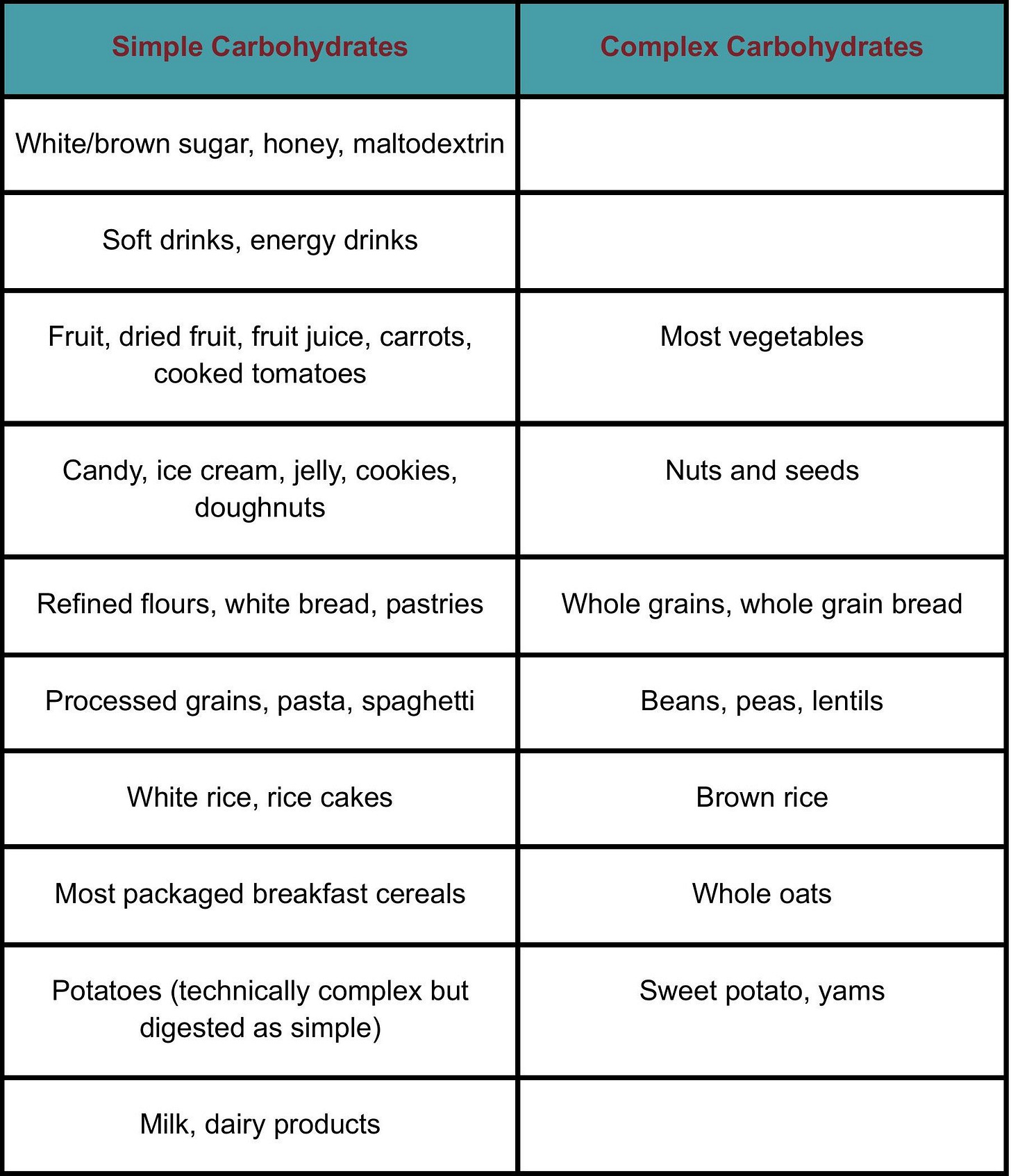The Best Carbs for Stress Management
An exploration of 'carb quality' and how to make the best carbohydrate choices to reduce stress and promote calmness. Read below for the complete explanation…
As mentioned in the previous post, carbohydrate is your body’s goto macro for energy and makes up the bulk of a typical Western diet. Carbohydrates are divided into two groups - simple carbohydrates and complex carbohydrates (see chart below).
Simple carbohydrates, sometimes called simple sugars, include fructose (fruit sugar), sucrose (table sugar), and lactose (milk sugar), as well as several other sugars. Complex carbohydrates are also made up of sugars, but the sugar molecules are strung together to form longer, more complex chains. Because they are more complex in structure, the body digests complex carbohydrates more slowly.
Simple Carbohydrates
When a simple sugar is ingested, your blood glucose begins to rise. Your body then senses that blood glucose levels are too high and, since it can't simply expel the glucose, stores it in muscle and liver tissue for later use. This brings the blood glucose back down, bringing your energy levels crashing down with it, potentially causing feelings of irritability, fatigue, brain fog, and even depression.
There’s no way to sugar-coat it. A diet high in added sugar leads to obesity, insulin resistance (which can develop into diabetes), increased gut permeability (AKA Leaky Gut Syndrome) and low-grade, chronic inflammation. The latter is of great concern to our mental health since inflammation can prompt changes in the brain that impact behaviour and mood. Recent studies have strongly linked systemic inflammation to impaired cognition and mood disorders - especially depression.
As explained in the previous post, another consequence of eating high-sugar foods is that they can lead to spikes in blood sugar levels, triggering the release of cortisol AKA The Stress Hormone. To avoid this happening, get in the habit of reading the nutrition facts label on foods to look for hidden simple sugars. Most labels now list the grams of carbohydrate and also specify the amount of sugar. This figure is the simple carbohydrate content and you should prefer foods with a low sugar quotient.
Complex Carbohydrates
The other carbohydrate type is complex carbohydrate – the good stuff – and some of this will likely be fibre (also commo
nly listed on food labels). Processed foods have usually been stripped of fibre. Dietary fibre is the part of a plant that is resistant to the body's digestive enzymes. Although fibre is indigestible, it slows digestion ensuring a constant, steady release of nutrients. Carbohydrates low in fibre will tend to be digested very quickly, raising your insulin levels and giving you another good reason to avoid processed food if you want to stabilise your emotions.
The Carb Conundrum
How strict should you be about avoiding simple sugars? That depends who you are. Some people are more ‘carb sensitive’ and will need to eliminate such foods as white bread, pasta, rice cakes and most breakfast cereals (the sneakiest source of hidden sugar known to humankind – make sure you read the label) and everyone’s physical and mental health, and energy levels would benefit from a carbohydrate intake heavily skewed in favour of complex carbs.
My recommendation is to take the transition in stages. For example, switch from white bread to whole-grain bread and see how far this gets you before considering eliminating bread completely. The key is to simply do better than you've been doing and gradually you'll start to see improvements in your ability to manage stress.





